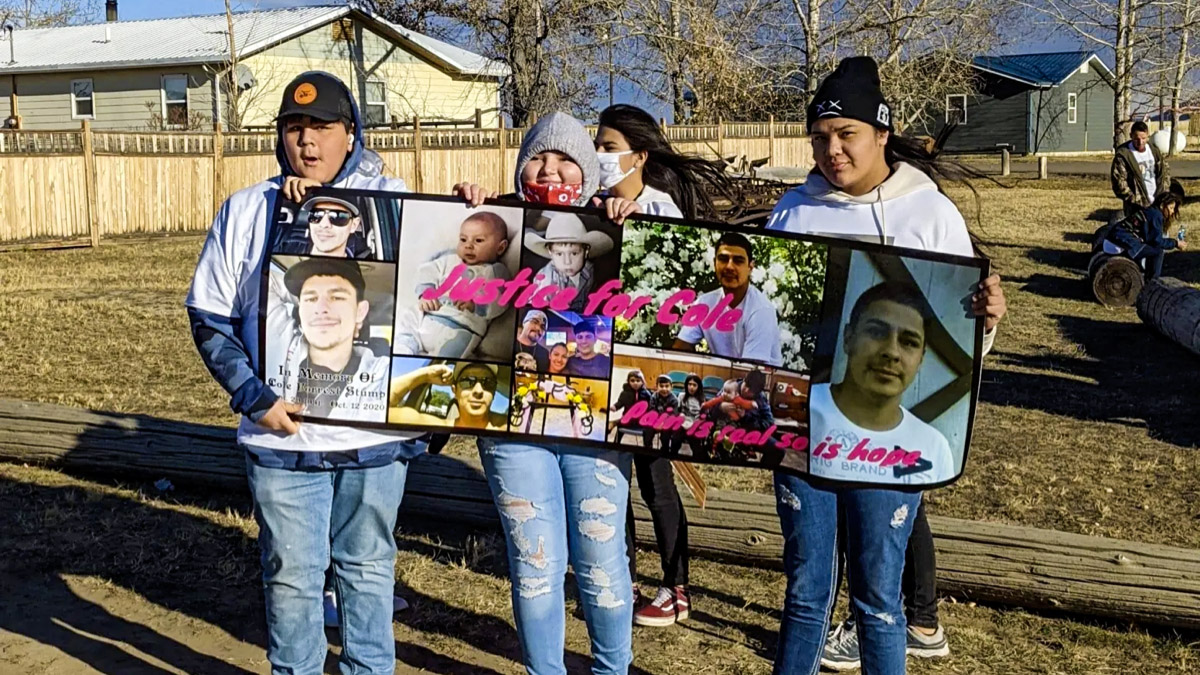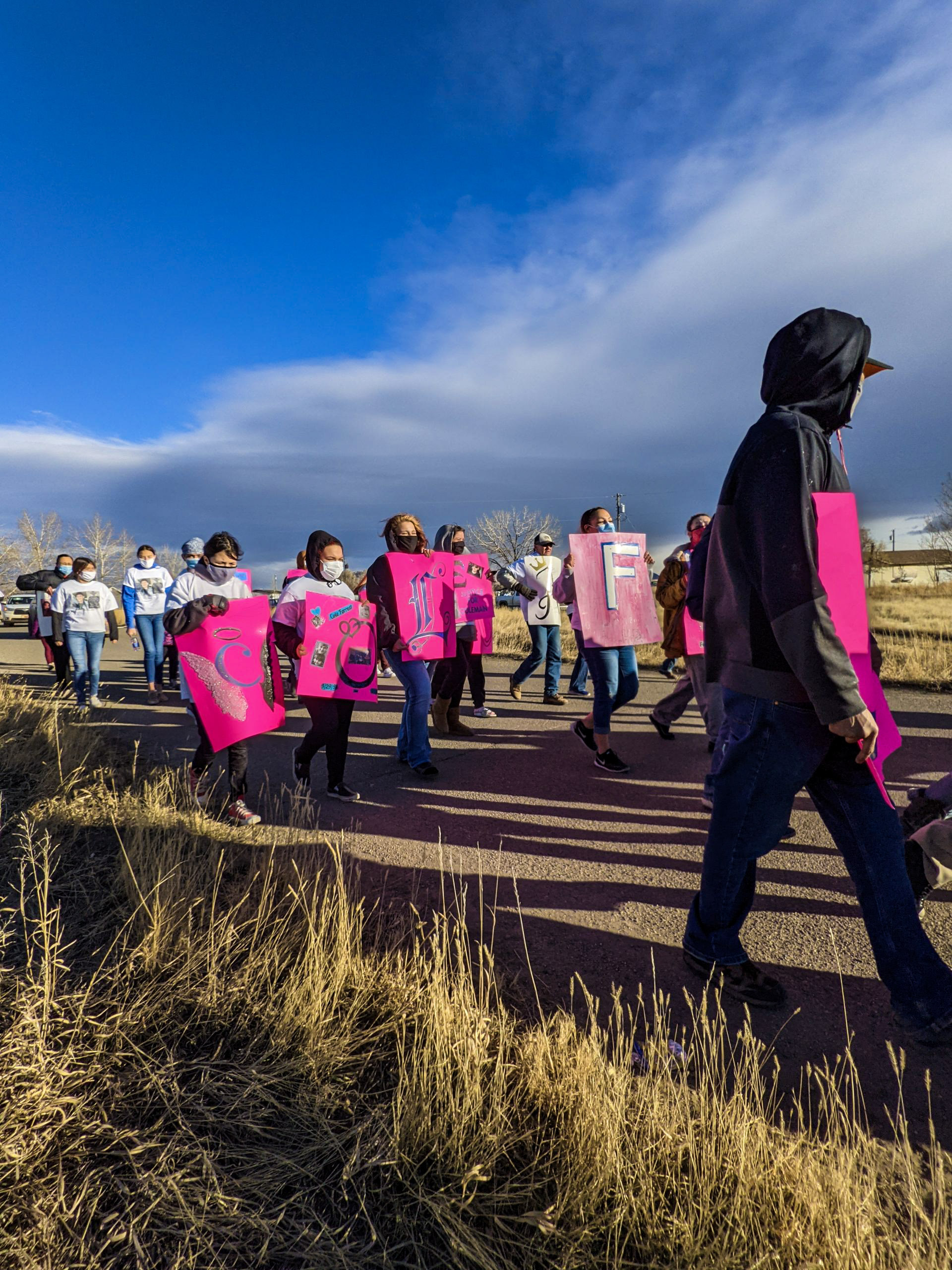Indianz.Com > News > Montana Free Press: Family of Native man killed by police seeks justice

Family hopes death spurs action
Billings police officers killed Coleman Stump in October. The death, and others in Billings, have led to calls for outside investigations of the department’s use of deadly force and other policy changes.
Wednesday, January 6, 2021
Montana Free Press
BOX ELDER — Wearing shirts with Coleman Stump’s picture and carrying banners and signs, dozens of people gathered on a warm, windy Saturday afternoon for a short march to call for changes to police department practices after Billings police killed the Chippewa Cree man in October.
The 50 or so people who gathered December 19 to march about a half-mile down the road to a school and back used the event to remember Coleman Stump as a father and sibling. They also hoped to illustrate what they described as larger problems within the Billings department regarding the frequency of police shootings and the department’s protocols for investigating those incidents.
“Let’s get some transparency in these departments,” said one of Stump’s sisters, Tasheena Duran, during Saturday’s event. “Let’s get something done.”
Billings Police Department officers
shot and killed Stump, of Box Elder, on the night of October 12 after responding to a call about suspicious activity.

Chris Aadland covers tribal affairs in Montana as a Report for America corps member based in Billings. Before moving to Montana he covered the Wind River Reservation in Wyoming for the Casper Star-Tribune, and has also reported for the Wisconsin State Journal. Contact Chris at caadland@montanafreepress.org and follow @cjaadland on Twitter.
Note: This story originally appeared on Montana Free Press. It is published under a Creative Commons license.
Search
Filed Under
Tags
More Headlines
South Dakota Searchlight: Trump terminations hit Indian Arts and Crafts Board
Native America Calling: Regional improvement in suicide statistics is hopeful sign
List of Indian Country leases marked for termination by DOGE
‘Let’s get ’em all done’: Senate committee moves quickly on Indian Country legislation
AUDIO: Senate Committee on Indian Affairs Business Meeting to consider several bills
VIDEO: Senate Committee on Indian Affairs Business Meeting to consider several bills
Native America Calling: The ongoing push for MMIP action and awareness
‘Blindsided’: Indian Country takes another hit in government efficiency push
Native America Calling: A new wave of resistance against Trans Native relatives
Urban Indian health leaders attend President Trump’s first address to Congress
‘Mr. Secretary, Why are you silent?’: Interior Department cuts impact Indian Country
Cronkite News: Two Spirit Powwow brings community together for celebration
Native America Calling: Native shows and Native content to watch
VIDEO: Oversight Hearing to Examine Native Communities’ Priorities for the 119th Congress
AUDIO: Oversight Hearing to Examine Native Communities’ Priorities for the 119th Congress
More Headlines
Native America Calling: Regional improvement in suicide statistics is hopeful sign
List of Indian Country leases marked for termination by DOGE
‘Let’s get ’em all done’: Senate committee moves quickly on Indian Country legislation
AUDIO: Senate Committee on Indian Affairs Business Meeting to consider several bills
VIDEO: Senate Committee on Indian Affairs Business Meeting to consider several bills
Native America Calling: The ongoing push for MMIP action and awareness
‘Blindsided’: Indian Country takes another hit in government efficiency push
Native America Calling: A new wave of resistance against Trans Native relatives
Urban Indian health leaders attend President Trump’s first address to Congress
‘Mr. Secretary, Why are you silent?’: Interior Department cuts impact Indian Country
Cronkite News: Two Spirit Powwow brings community together for celebration
Native America Calling: Native shows and Native content to watch
VIDEO: Oversight Hearing to Examine Native Communities’ Priorities for the 119th Congress
AUDIO: Oversight Hearing to Examine Native Communities’ Priorities for the 119th Congress
More Headlines